An up close and personal interview with Marine Veteran and Togetherweserved.com Member:
Sgt Thomas Kelly (USMC 1964-1969)
WHAT PERSUADED YOU TO JOIN THE MARINES?
 I always knew I’d join the Marines. My dad was a Marine on Guam during WWII. When I was in college I inquired about the Platoon Leaders Class but they weren’t accepting anyone with vision worse than 20/40 so I didn’t qualify. As a freshman I was required to enroll in Army ROTC and I liked it, sort of. I almost convinced myself that Army Airborne was as good as the Marine Corps. Then one day I accompanied a buddy to the Marine Corps Reserve Center in Miami and after talking with a hard-as-nails Master Sergeant I knew the Marine Corps was where I belonged. Not that I was tough as nails, far from it, but I knew I could learn a lot from that senior NCO and maybe, someday, be like him. I always knew I’d join the Marines. My dad was a Marine on Guam during WWII. When I was in college I inquired about the Platoon Leaders Class but they weren’t accepting anyone with vision worse than 20/40 so I didn’t qualify. As a freshman I was required to enroll in Army ROTC and I liked it, sort of. I almost convinced myself that Army Airborne was as good as the Marine Corps. Then one day I accompanied a buddy to the Marine Corps Reserve Center in Miami and after talking with a hard-as-nails Master Sergeant I knew the Marine Corps was where I belonged. Not that I was tough as nails, far from it, but I knew I could learn a lot from that senior NCO and maybe, someday, be like him.
BRIEFLY, WHAT WAS YOUR CAREER PATH IN THE SERVICE?
I joined 4th ANGLICO, USMCR and did six months of boot camp, ITR and OJT with 2nd ANGLICO at Camp Lejeune. Back in Miami I was a 2531 radio operator in a Naval Gunfire Spotter Team. During brief periods of active duty I went to jump school at Fort Benning, Georgia and naval gunfire spotters training at Little Creek, Virginia and Vieques, Puerto Rico.
A transfer in my civilian job took me to Boston, Massachusetts and Comm Platoon, 1/25 USMCR. This was in 1967 and Vietnam, which had been a faint rumbling on the horizon when I first joined the reserves, was now a roaring tiger. I expected the reserves to be called up but they weren’t. I was afraid the war would end without me seeing it so I transferred from reserve to regular and requested ground forces, WestPac. My orders read Sub-Unit 1, 1st ANGLICO, however in Okinawa I was reassigned to the 3rd Marine Division because of a critical shortage of 2531s. I went to 3/3 and talked the Comm Officer into putting me in a Tactical Air Control Party because I had a little forward air control training with 2nd ANGLICO. I spent the next ten months attached to line companies, mostly Mike Company. My duties included communicating with aerial observer spotter planes, controlling helicopter gunships and fixed wing aircraft during enemy contacts, running medevacs, and when no HST was aboard handling the LZ for aerial resupply. I made lifelong friendships in the line companies, grunts are the best people on earth. Later I went to the battalion CP and became the TACP Chief. I expected the reserves to be called up but they weren’t. I was afraid the war would end without me seeing it so I transferred from reserve to regular and requested ground forces, WestPac. My orders read Sub-Unit 1, 1st ANGLICO, however in Okinawa I was reassigned to the 3rd Marine Division because of a critical shortage of 2531s. I went to 3/3 and talked the Comm Officer into putting me in a Tactical Air Control Party because I had a little forward air control training with 2nd ANGLICO. I spent the next ten months attached to line companies, mostly Mike Company. My duties included communicating with aerial observer spotter planes, controlling helicopter gunships and fixed wing aircraft during enemy contacts, running medevacs, and when no HST was aboard handling the LZ for aerial resupply. I made lifelong friendships in the line companies, grunts are the best people on earth. Later I went to the battalion CP and became the TACP Chief.
At the end of my tour I was offered an appointment to OCS but I turned it down - a decision I regret to this day! I had experienced a tremendous amount of combat in my tour of duty and the prospect of leading a platoon in combat, knowing exactly what that entailed, was more that I could deal with at that point in my life. After Vietnam I went to Marine Barracks, Sasebo, Japan, made Sergeant E-5 and spent the remainder of my enlistment as a guard NCO.
DID YOU PARTICIPATE IN COMBAT OPERATIONS?
I participated in Operations Kentucky, Napoleon / Saline, Lancaster II, Scotland II and Taylor Common which are discussed in more detail below.
FROM YOUR ENTIRE SERVICE CAREER WHAT PARTICULAR MEMORY STANDS OUT?
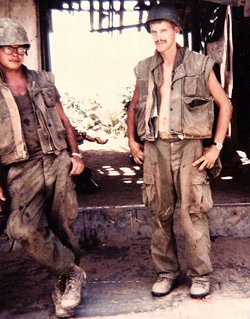 Calling in close air support for a locked-on infantry company is a tremendous rush for a Corporal. Briefing the pilots, adjusting their hits, feeling the heat of the napalm, hearing bomb casing cracking as they explode, joining the company-on-line assault on an enemy position after the fast movers go high and dry; those are all unforgettable experiences but as exciting as that was it was secondary compared to running a medevac. Coordinating with the Corpsman and the helicopter crews to get a wounded Marine off the battle area and on his way to life saving medical treatment was by far the most rewarding experience for me. When the LZ was hot everyone in the company was involved. We ran the wounded to the aircraft knowing the grunts and FO's were doing everything they could to pin down the enemy. With the rotor wash and noise you didn’t know if you were taking fire or not, you just focused on getting that Marine aboard that bird and out of there. Calling in close air support for a locked-on infantry company is a tremendous rush for a Corporal. Briefing the pilots, adjusting their hits, feeling the heat of the napalm, hearing bomb casing cracking as they explode, joining the company-on-line assault on an enemy position after the fast movers go high and dry; those are all unforgettable experiences but as exciting as that was it was secondary compared to running a medevac. Coordinating with the Corpsman and the helicopter crews to get a wounded Marine off the battle area and on his way to life saving medical treatment was by far the most rewarding experience for me. When the LZ was hot everyone in the company was involved. We ran the wounded to the aircraft knowing the grunts and FO's were doing everything they could to pin down the enemy. With the rotor wash and noise you didn’t know if you were taking fire or not, you just focused on getting that Marine aboard that bird and out of there.
I can't describe the respect we had for the chopper crews, sitting in the zone in stoic silence, or even worse, hovering above the trees waiting to take our wounded buddies out as the enemy sent rounds through their aircraft. When the chopper was away and we were back in our holes I’d exchange a glance with the senior Squid, knowing we had done our duty and completed our mission. Often you never knew if they made it or not but then decades later when you see that same Marine at a reunion, well, you can’t stop smiling.
WHICH INDIVIDUAL PERSON FROM YOUR SERVICE STANDS OUT AS THE ONE WHO HAD THE BIGGEST IMPACT ON YOU...AND WHY?
Lt. Col. James Wesley Marsh was an officer of such outstanding character that his impact was felt not just by me but by our whole battalion. I witnessed him join a squad size recon patrol deep in Leatherneck Square. I saw him rushing grenades up to Marines at the point of contact. I heard about him picking up an M-60 and wading through a hedgerow mowing down NVA. I heard him on the radio talking to higher ups, insisting his Marines get the support they need. During Tet he stood at the outer wire encouraging and commending us as we came dragging in after a horrendous and costly engagement with the NVA. After a "fragging" incident in Quang Tri we stood at attention as he said he loved us like his own sons and the person that did that cowardly thing should come forward and surrender because he didn’t deserve to go to combat with the rest of us. I saw him carry a PRC-25 radio up Dong Ha Mountain when he put his operator on point as he moved his command group up to Mike Company. I helped him take off that radio and heard him murmur, “Now I know why the Marine Corps has no forty year old radiomen.” He was smart, firm, compassionate and funny and he epitomized what it is to be a leader. He cared for us and we respected and loved him for it.
WHAT PROFESSION DID YOU FOLLOW AFTER THE SERVICE AND WHAT ARE YOU DOING NOW?
After discharge I went to work for Northeast Airlines, which later merged into Delta Air Lines. I started as a radio operator but over the years did just about every job except fly the planes. I also started an underwater services business, at first just knocking barnacles off sailboats but that led to underwater ship repair, at one point I was the busiest diver at the Port of Miami - I worked the airline at night and diving business by day. I sold the diving business when I hit my mid forties and got into management at Delta. I also did some freelance writing for magazines like Yachting and Vietnam. In 1991 I had a book published called DMZ Diary, it's a memoir of my Vietnam tour.
In 1998 I took early retirement from Delta, leaving as Supervisor of Airport Services. Six months later I was in Rwanda, Africa working for the United Nations Development Program as the Communications Coordinator. I ran a 24/7 radio room for the security cell, oversaw the radio workshop and managed IT. I got the job offer from a Marine buddy, of course. It was supposed to be for three months but I was there for over a year. Besides my communications and management skills my military experience was sought by UN security officers who were mostly retired military from Canada and other countries but who lacked actual combat experience. I helped pinpoint potential ambush sites along travel routes and set up a network of radio repeater sites to cover routes traveled by UN personnel. Africa working for the United Nations Development Program as the Communications Coordinator. I ran a 24/7 radio room for the security cell, oversaw the radio workshop and managed IT. I got the job offer from a Marine buddy, of course. It was supposed to be for three months but I was there for over a year. Besides my communications and management skills my military experience was sought by UN security officers who were mostly retired military from Canada and other countries but who lacked actual combat experience. I helped pinpoint potential ambush sites along travel routes and set up a network of radio repeater sites to cover routes traveled by UN personnel.
In 2002 the United Nations offered me a position in Afghanistan as the Air Operations Officer in Kabul. This was tougher duty than Rwanda, with very primitive living conditions and shaky security and it utilized my aviation background. In essence I was the Kabul station manager for UNHAS, the United Nations Humanitarian Air Service. We operated a 75 passenger jet to Islamabad, a fleet of Beechcraft planes for internal flights, three C-130's for cargo lift and eight MI8 helicopters for assessment missions. The only military skill I used there was instantly hitting the deck when the Taliban attacked the passenger terminal but thanks to French ISAF forces they were quickly repulsed.
For the last eight years I’ve been working as a boat captain in the Florida Keys. I worked on dive boats, ferry boats, a 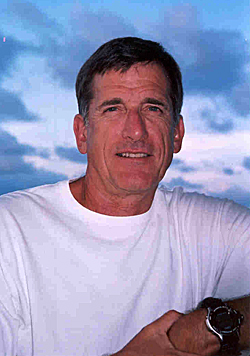 National Park Service resupply ship and now I captain a research vessel for the Florida Keys Community College. I take scientists out for reef monitoring and restoration and also shark research. National Park Service resupply ship and now I captain a research vessel for the Florida Keys Community College. I take scientists out for reef monitoring and restoration and also shark research.
HOW HAS SERVING THE ARMED FORCES INFLUENCED THE WAY YOU HAVE APPROACHED YOUR LIFE AND CAREER?
When I started my first job after discharge, handling all company flights south of Wilmington, NC and west to Los Angeles, I felt nervous, almost panicked. Then I thought, hey, there’s no little Vietnamese guy trying to shoot me with an AK-47 so I’ve got nothing to worry about. I remember that thought every time life throws me a curve because whatever it is, I’ve seen worse.
The Marine Corps put a lot of responsibility on me at a very tender age. They thought I could handle it and to my surprise, I did. Actually, as a 22 year old corporal I had more responsibility - life and death type responsibility - than in any other period of my life. An experience like that helps to put everything else into perspective. People complain about the silliest stuff. Everybody does it, even me, but thanks to my military experience I know deep down what the really important stuff is.
HOW HAS TOGETHERWESERVED.COM HELPED YOU TO MAINTAIN A BOND WITH THE SERVICE AND THOSE YOU SERVED WITH?
TogetherWeServed.com has been great. I’ve connected with guys I served with in 4th ANGLICO, 2nd ANGLICO, 3/3 and Marine Barracks Sasebo, Japan. One of the best things was contacting my senior drill instructor. I got to thank Sgt. Major Adelman for making me a Marine and keeping me alive in Vietnam. I even hear from guys who weren’t in my unit but were in the same operations. I really enjoy connecting with them and all Marines and Corpsmen from all eras. We share a culture that few others understand or can appreciate. We truly are the few and the proud. |
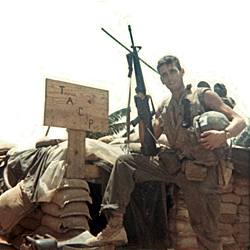
Sgt Thomas Kelly
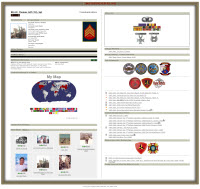
View Sgt Thomas Kelly's Shadowbox on TWS
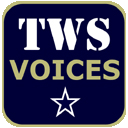
Read Other Interviews in the TWS Voices Archive
|